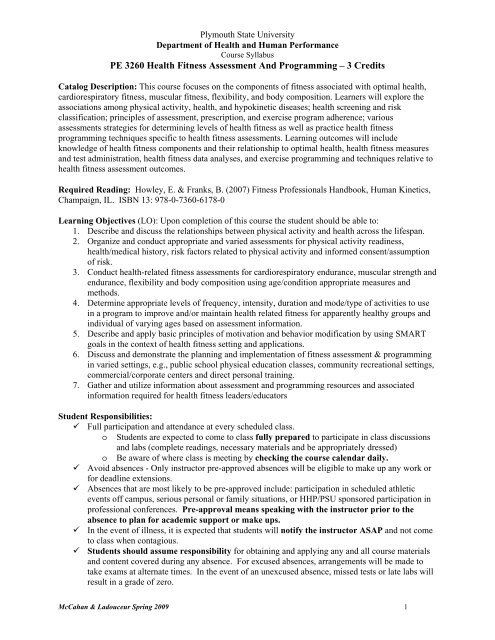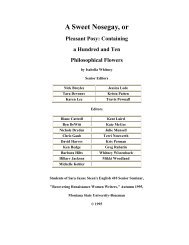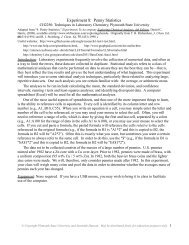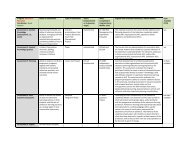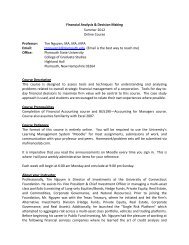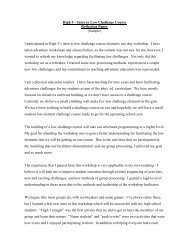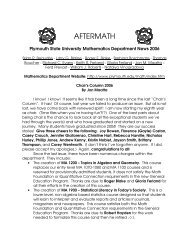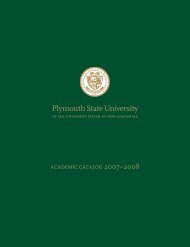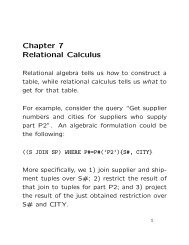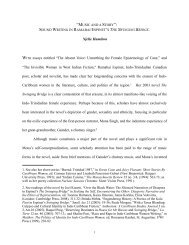sample syllabus - Plymouth State University
sample syllabus - Plymouth State University
sample syllabus - Plymouth State University
You also want an ePaper? Increase the reach of your titles
YUMPU automatically turns print PDFs into web optimized ePapers that Google loves.
<strong>Plymouth</strong> <strong>State</strong> <strong>University</strong>Department of Health and Human PerformanceCourse SyllabusPE 3260 Health Fitness Assessment And Programming – 3 CreditsCatalog Description: This course focuses on the components of fitness associated with optimal health,cardiorespiratory fitness, muscular fitness, flexibility, and body composition. Learners will explore theassociations among physical activity, health, and hypokinetic diseases; health screening and riskclassification; principles of assessment, prescription, and exercise program adherence; variousassessments strategies for determining levels of health fitness as well as practice health fitnessprogramming techniques specific to health fitness assessments. Learning outcomes will includeknowledge of health fitness components and their relationship to optimal health, health fitness measuresand test administration, health fitness data analyses, and exercise programming and techniques relative tohealth fitness assessment outcomes.Required Reading: Howley, E. & Franks, B. (2007) Fitness Professionals Handbook, Human Kinetics,Champaign, IL. ISBN 13: 978-0-7360-6178-0Learning Objectives (LO): Upon completion of this course the student should be able to:1. Describe and discuss the relationships between physical activity and health across the lifespan.2. Organize and conduct appropriate and varied assessments for physical activity readiness,health/medical history, risk factors related to physical activity and informed consent/assumptionof risk.3. Conduct health-related fitness assessments for cardiorespiratory endurance, muscular strength andendurance, flexibility and body composition using age/condition appropriate measures andmethods.4. Determine appropriate levels of frequency, intensity, duration and mode/type of activities to usein a program to improve and/or maintain health related fitness for apparently healthy groups andindividual of varying ages based on assessment information.5. Describe and apply basic principles of motivation and behavior modification by using SMARTgoals in the context of health fitness setting and applications.6. Discuss and demonstrate the planning and implementation of fitness assessment & programmingin varied settings, e.g., public school physical education classes, community recreational settings,commercial/corporate centers and direct personal training.7. Gather and utilize information about assessment and programming resources and associatedinformation required for health fitness leaders/educatorsStudent Responsibilities: Full participation and attendance at every scheduled class.o Students are expected to come to class fully prepared to participate in class discussionsand labs (complete readings, necessary materials and be appropriately dressed)o Be aware of where class is meeting by checking the course calendar daily. Avoid absences - Only instructor pre-approved absences will be eligible to make up any work orfor deadline extensions. Absences that are most likely to be pre-approved include: participation in scheduled athleticevents off campus, serious personal or family situations, or HHP/PSU sponsored participation inprofessional conferences. Pre-approval means speaking with the instructor prior to theabsence to plan for academic support or make ups. In the event of illness, it is expected that students will notify the instructor ASAP and not cometo class when contagious. Students should assume responsibility for obtaining and applying any and all course materialsand content covered during any absence. For excused absences, arrangements will be made totake exams at alternate times. In the event of an unexcused absence, missed tests or late labs willresult in a grade of zero.McCahan & Ladouceur Spring 2009 1
<strong>Plymouth</strong> <strong>State</strong> <strong>University</strong>Department of Health and Human PerformanceCourse SyllabusPE 3260 Health Fitness Assessment And Programming – 3 CreditsAssignments and Assessments: Rubrics will be provided for all work other than tests:A. Objective Examinations: (300 points total) (LO-1-5). Three exams @ 100 points each. Thesewill include multiple choice, true/false, short answer and some case study analysis/computationquestions.B. Fitness Assessment Experiences: (100 points total) (LO 2, 3, 4) Students will participate inpersonal and professional fitness assessment activities. Some will involve in class labs, others willrequire out of class activities. Each will require preparation by reading in the text and applyingpractical skills necessary to assess health status, evaluate risk, obtain informed consent, and assessall components of health-related fitness using laboratory and field-based assessments.C. Class Project Case Study: (100 points) (LO 2, 3, 4, 5, 6, 7) Using case study methodology,students will secure a willing and engaged client to be a test subject and receiver of a full fitnessassessment and general prescription for health-related physical activity. SMART goals will bedeveloped and documented.D. Special topic group presentation and attendance: (50 points) (LO 5, 6, 7) Attendance will berecorded and students will present at least one special topic/chapter review to the class.Course Grading: A grade will be assigned as a percentage of 400 total points as follows.A 93-100 % A- 90-92 % B+ 87-89 % B 83-86 %B- 80-82 % C+ 77-79 % C 73-76 % C- 70-72 %D+ 67-69 % D 63-66 % D- 60-62 % F < 59.5 %Note: The Americans with Disabilities Act (ADA) is a federal anti-discrimination statue that providescomprehensive civil rights protection for persons with disabilities. If you believe you have a disabilityrequiring an accommodation, please contact the Counselor for Students with Disabilities at <strong>Plymouth</strong>Academic Support Services (PASS). The web address for PASS ishttp://www.plymouth.edu/pass/serve.htm. As your instructor, and if you are willing, I would appreciateknowing if you have any unique physical, medical, mental, or learning abilities. This information mayassist me in accommodating for diversity among our students.Academic Integrity: All work submitted in this course must be your own and produced exclusively forthis course. The use of sources (ideas, quotations, and paraphrases) must be properly acknowledged anddocumented (APA format). Violations of university policy will be reported in accordance with theprocedures outlined under Academic Policies and Procedures - Academic Integrity athttp://www.plymouth.edu/registrar/academic_policies.html.Academic dishonesty, as defined by <strong>Plymouth</strong> <strong>State</strong> <strong>University</strong>, is an intentional act of deception in one ofthe following areas: Cheating – use or attempted use of unauthorized materials, information, or study aids. Fabrication – falsification or invention of any information. Assisting – helping another commit an act of academic dishonesty. Tampering – altering or interfering with evaluation instruments and documents. Plagiarism – representing the works of ideas of another person as one’s own.McCahan & Ladouceur Spring 2009 2


